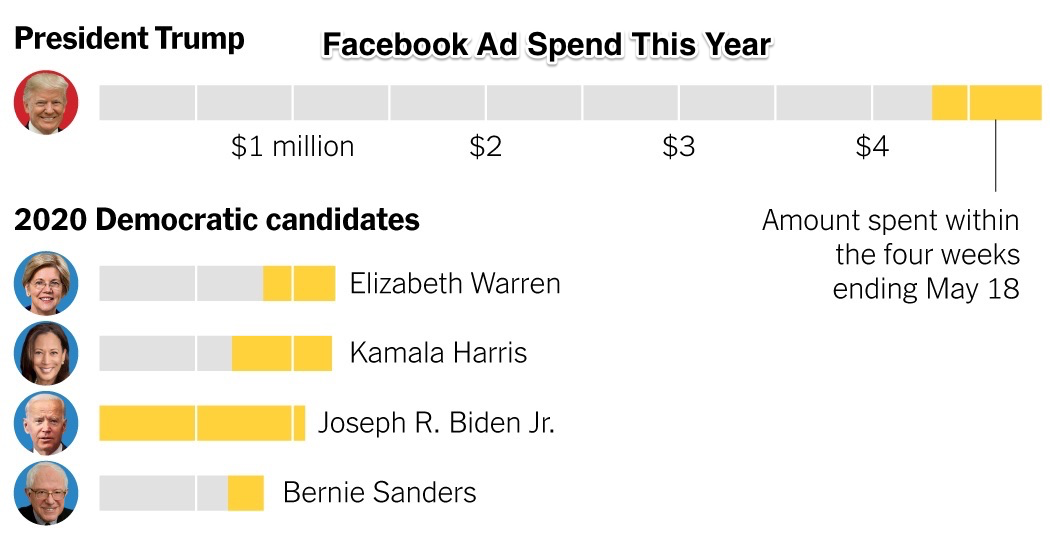Social Media
Zuckerberg defends political ads that will be 0.5% of 2020 revenue

As Jack Dorsey announced his company Twitter would drop all political ads, Facebook CEO Zuckerberg doubled-down on his policy of refusing to fact check politicians’ ads. “At times of social tension there has often been an urge to pull back on free expression . . . We will be best served over the long term by resisting this urge and defending free expression.”
Still, Zuckerberg failed to delineate between freedom of expression, and freedom of paid amplification of that expression which inherently favors the rich.
During today’s Q3 2019 earnings call where Facebook beat expectations and grew monthly users 2% to 2.45 billion, Zuckerberg spent his time defending the social network’s lenient political ad policy.
One clear objective was to dispel the idea that Facebook was motivated by greed to keep these ads. Zuckerberg explained “We estimate these ads from politicians will be less than 0.5% of our revenue next year.” For reference, Facebook earned $66 billion in the 12 months ending Q3 2019, so Facebook might earn around $330 million to $400 million in political ads next year.
Zuckerberg also said that given Facebook removed 50 million hours per day of viral video watching from its platform to support well-being which hurt ad viewership and the company’s share price, Facebook clearly doesn’t act solely in pursuit of profit.
Facebook’s CEO also tried to bat down the theory that Facebook is allowing misinformation in political ads to cater to conservatives or avoid calls of bias from them. “Some people say that this is just all a cynical political calculation and that we’re acting in a way that we don’t really believe because we’re just trying to appease conservatives” he said, responding that “frankly, if our goal was that we’re trying to make either side happy then we’re not doing a very good job because I’m pretty sure everyone is frustrated.”
Instead of baning political ads, Zuckerberg voiced support for increasing transparency about how ads look, how much is spent on them, and where they’re run. “I believe that the better approach is to work to increase transparency. Ads on Facebook are already more transparent than anywhere else. We have a political ads archive so anyone can scrutinize every ad that’s run.”
He mentioned that political ads are run by “Google, YouTube, and most internet platforms”, seeming to stumble for a second as he was likely prepared to cite Twitter too until it announced it would drop all political ads an hour earlier.
Dorsey had tweeted that “We’ve made the decision to stop all political advertising on Twitter globally. We believe political message reach should be earned, not bought.”
Twitter’s CEO took some clear swipes at Zuckerberg, countering his common arguments for allowing misinformation in politician’s ads. “Some might argue our actions today could favor incumbents. But we have witnessed many social movements reach massive scale without any political advertising. I trust this will only grow.” Given President Trump had outspent all Democratic candidates on Facebook ads as of March of this year, it’s clear that deep-pocketed incumbents could benefit from Facebook’s policy.

Trump continues to massively outspend Democratic rivals on Facebook ads. Via NYT
Miming Facebook’s position, Dorsey tweeted “It‘s not credible for us to say: ‘We’re working hard to stop people from gaming our systems to spread misleading info, buuut if someone pays us to target and force people to see their political ad…well…they can say whatever they want!”
-

 Entertainment7 days ago
Entertainment7 days agoExplainer: Age-verification bills for porn and social media
-

 Entertainment6 days ago
Entertainment6 days agoIf TikTok is banned in the U.S., this is what it will look like for everyone else
-

 Entertainment6 days ago
Entertainment6 days ago‘Night Call’ review: A bad day on the job makes for a superb action movie
-

 Entertainment6 days ago
Entertainment6 days agoHow ‘Grand Theft Hamlet’ evolved from lockdown escape to Shakespearean success
-

 Entertainment6 days ago
Entertainment6 days ago‘September 5’ review: a blinkered, noncommittal thriller about an Olympic hostage crisis
-

 Entertainment6 days ago
Entertainment6 days ago‘Back in Action’ review: Cameron Diaz and Jamie Foxx team up for Gen X action-comedy
-

 Entertainment6 days ago
Entertainment6 days ago‘One of Them Days’ review: Keke Palmer and SZA are friendship goals
-

 Entertainment3 days ago
Entertainment3 days ago‘The Brutalist’ AI backlash, explained

















